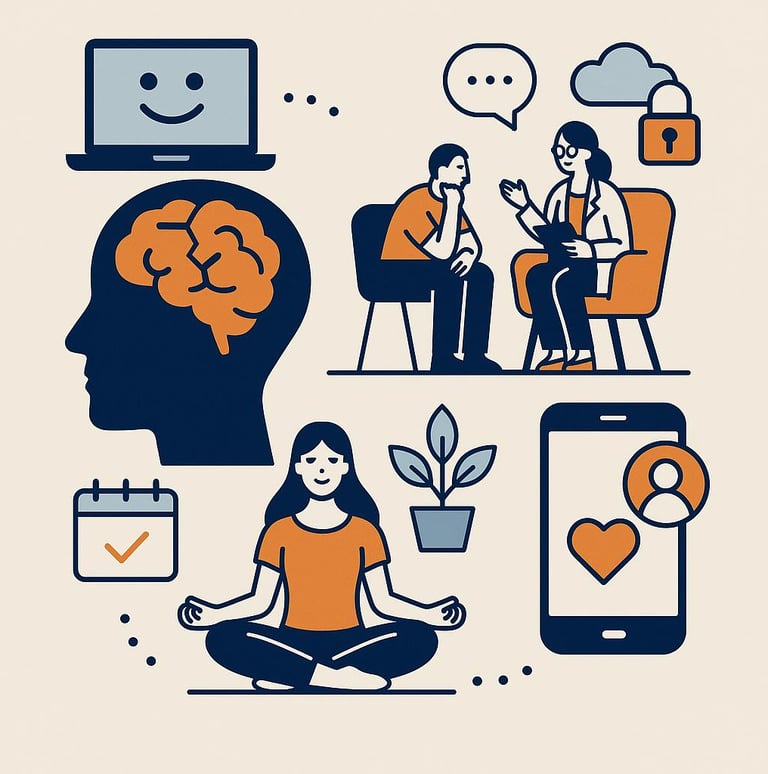Coping With Sextortion Trauma: Mental Health Recovery in a Digital World
Learn how victims of sextortion can recover mentally with therapy, support tools, and help from platforms like DrPhishing.ai.
HIMSSwire
7/11/20253 min read


Coping With Sextortion Trauma: Mental Health Recovery in a Digital World
The emotional aftermath of a sextortion attack is often more devastating than the crime itself. Victims don't just lose privacy they lose trust in themselves, others, and the internet.
They face a silent, internal battle that many people around them may never see. Shame, anxiety, panic attacks, and fear of social rejection frequently follow. And unless addressed with care and professionalism, the emotional scars can linger for years.
While the crime is often discussed in terms of digital forensics or takedown services, mental health is rarely part of the initial conversation. But healing emotionally is just as important as removing harmful content.
In this article, we explore how to cope mentally with the trauma caused by online sextortion, how professional treatment can help, and why integrated platforms like DrPhishing.ai are redefining how victims can recover both online and offline.
Understanding the Invisible Wounds of Sextortion
Unlike many other digital crimes, sextortion targets one’s dignity, vulnerability, and identity. The victim might feel violated in a deeply personal way, which leads to unique psychological effects such as:
Constant fear of exposure
Relentless guilt and self-blame
Social withdrawal and isolation
Panic attacks or insomnia
Suicidal thoughts in extreme cases
Often, these reactions are hidden. Friends and family may be unaware of what the victim is going through, making the trauma more complex to handle.
Even though the incident may involve explicit content or manipulation, victims must understand : they are not at fault. Perpetrators use deceit, coercion, and threats to trap their targets. This clarity is the first step toward healing.
The Importance of Professional Mental Health Support
Recovery is not a matter of “just moving on.” Sextortion is emotional abuse, and like all forms of trauma, it requires dedicated care. Professional mental health services play a crucial role by helping victims:
Make sense of their emotions
Reframe damaging thoughts
Rebuild self-esteem and confidence
Develop tools for emotional regulation
More importantly, therapy helps break the cycle of silence. It provides a confidential, judgment-free space where victims can speak freely often for the first time since the incident occurred.
Types of Therapy That Help
Different types of therapy have been effective in treating the psychological effects of sextortion. These include:
1. Cognitive Behavioral Therapy (CBT)
CBT focuses on identifying and challenging negative thought patterns. Victims often internalize blame or obsess over worst-case scenarios. CBT helps reframe these into healthier, more constructive thoughts.
2. Trauma-Informed Therapy
This approach considers the emotional, physical, and neurological responses to trauma. It empowers the individual, helps restore control, and teaches how to safely confront traumatic memories.
3.EMDR (Eye Movement Desensitization and Reprocessing)
This technique is useful for those suffering from PTSD or intense flashbacks. EMDR allows the brain to reprocess traumatic memories, reducing their emotional charge over time.
4.Anonymous Online Counseling
For those hesitant to seek face-to-face help, anonymous platforms offer privacy and flexibility. Many victims find it easier to start their healing journey online—without fear of being recognized.
Everyday Coping Strategies
Therapy is essential, but day-to-day self-care also contributes significantly to recovery. Victims can take these steps to support their mental well-being:
Limit social media exposure to reduce re-traumatization
Keep a journal to express thoughts and track emotional progress
Practice mindfulness or breathing exercises during panic episodes
Avoid isolation by staying connected to trusted friends
Use structured routines to rebuild a sense of normalcy
The Role of Integrated Platforms
Many victims feel overwhelmed by the idea of seeking help in multiple places - mental health, legal aid, content removal, and technical support. This is where platforms like DrPhishing.ai are creating real change.
Instead of focusing only on digital takedowns, they offer emotional support, crisis counseling, and education on how to respond to threats in a calm, empowered way. By combining cybersecurity with psychological first aid, services like this give victims everything they need in one place.
Why Early Help Matters
The sooner a victim begins the recovery process, the better the long-term outcome. Mental health professionals emphasize that early intervention can prevent trauma from turning into chronic depression, substance abuse, or even suicidal ideation.
If you or someone you know has experienced sextortion (also known in South Korea as 몸캠피싱, don't delay in seeking help. Whether through therapy, peer support, or platforms, there is a path forward.
Final Thoughts
Digital crimes like sextortion do not only affect data or privacy—they deeply impact the mind. While police reports and content removal are essential, true healing happens when emotional wounds are acknowledged and treated.
You are not alone. Help is available, and recovery is possible. It takes courage to ask for help, but that single step may be the start of reclaiming your peace, your confidence, and your future.


